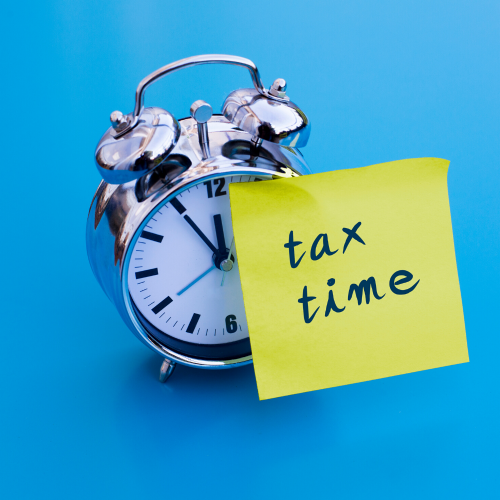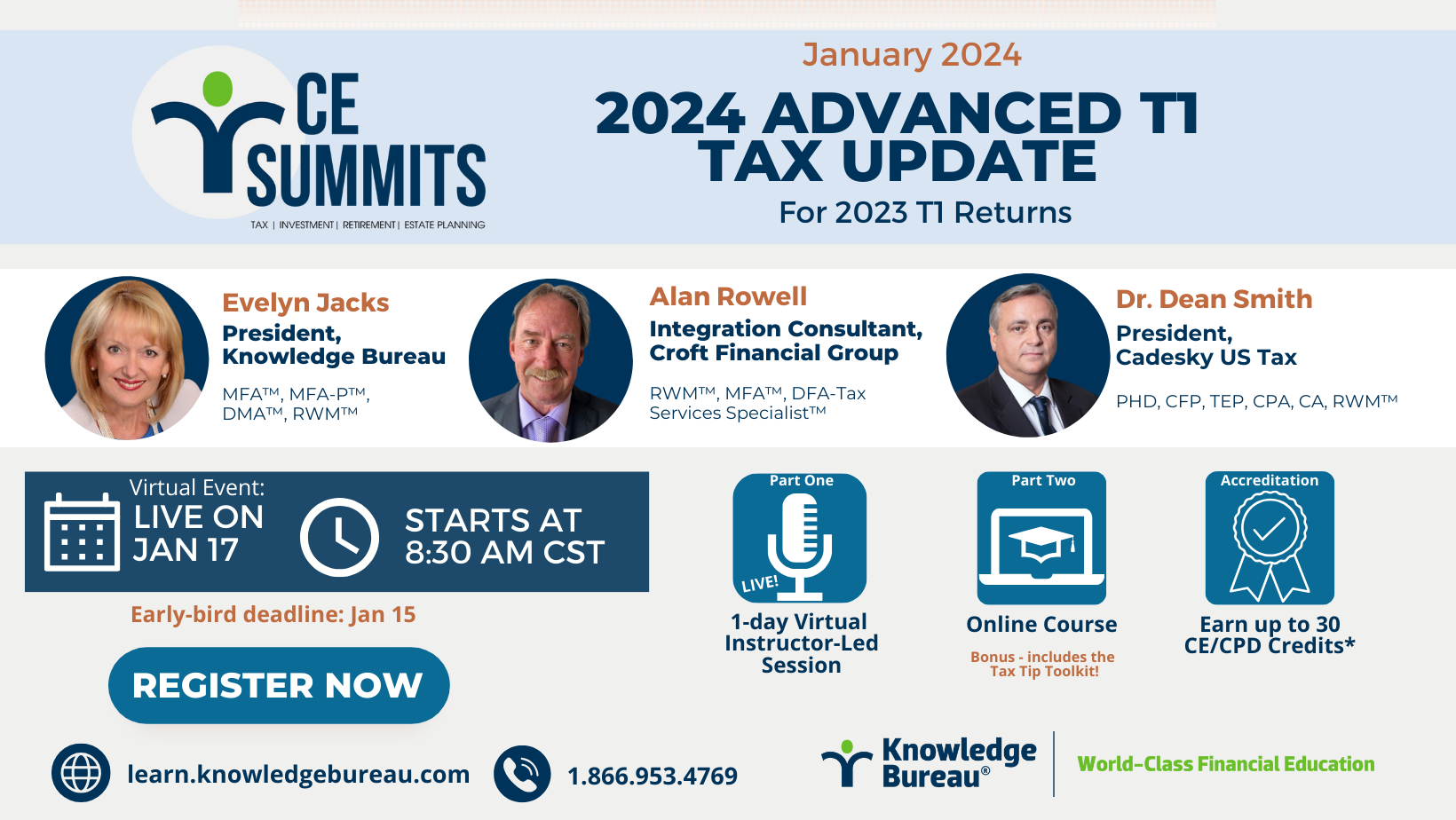Tax Season 2024 Begins with Purpose

Evelyn Jacks
With all the challenges Canadians are facing making dollars stretch these days, there is some good news on the horizon: Tax Season 2024! It’s going to be full of a multitude of tax changes that can lead to a potential refund, increased tax free credits, especially if RRSP season is purposeful in reducing family net income. But for some, a balance due to CRA will come with high interest charges if it can’t be paid by the April 30 filing deadline.
To pull ahead of high inflation, interest rates and new taxes, taxpayers and their advisors will want to quickly sharpen tax and financial skills in the new year for those challenging times ahead, says Knowledge Bureau Founder and President Evelyn Jacks, best-selling tax financial author and award-winning educator. The good news? Most people can find new tax relief due to a host of changes, together with highly educated specialists who can help.
“Canadians continue to struggle through the most significant economic shock since 2019. With continued levels of uncertainty related to housing and food insecurity,” says Mrs. Jacks, “ tax and financial advisors can really shine by providing essential financial services that can lead directly to financial relief. This is particularly true during tax season and it begins with selecting a highly qualified team of advisors.”
Correct Tax Failing Errors and Omissions. There are immediate ways to increase cash flow, including tax recovery initiatives. By adjusting prior filed returns and filing missed returns to  recover tax credits and deductions as well as tax refunds, many families can receive thousands of new dollars they didn’t know they had.
recover tax credits and deductions as well as tax refunds, many families can receive thousands of new dollars they didn’t know they had.
Pay Tax Balances ASAP. For those that pay, the balances due at tax filing time have risen significantly over the years, says Mrs. Jacks, “Now, with a 10% prescribed interest rate on outstanding balances starting January 1, 2024 there are many compelling reasons to pay off tax debt as soon as possible and plan with more tax efficiency in mind.”
Tax Planning with a Pro Can Help. Adapting to economic challenges more proactively begins with finding the right professionals, who have up-to-date credentials. That’s challenging for many people, says Jacks, because it does involve fees for professional services.
But it can lead to the making of foundational investments that will secure a household’s future. “By finding an Advisor for Your Future - someone with deep and broad knowledge who can understand your financial challenges and goals – you can be on sounder footing towards financial peace of mind,” says Jacks, “and that’s what true wealth really is.”
Financial Specialist Help with Life Events. Finding the right help is important to be ready for the financial consequences of life events: when there is a medical emergency, a disability or death in the family, for example, or when there are family debt, investment, retirement, succession and estate planning needs. “Your pro can help you think about the short- and long-term plans to get your financial health back,” says Jacks. “The goal is to increase after-tax cash flow and increasingly important: manage tax audit surprises from the CRA.”
The 2024 Tax Filing and Investment Planning Milestones Checklist. Knowledge Bureau’s newest resource as a primer in conversations between advisors and clients - must be a KBR subscriber to download! “Is everyone receiving all the government benefits they are entitled to? Consider what’s available every month for seniors - Old Age Security, Canada Pension Plan, Guaranteed Income Supplement, Veterans Disability Benefits, and for others - Employment Insurance, and the Canada Child Benefit. Quarterly, there is the Climate Action Incentive, the GST/HST Credit as well as the Canada Workers Benefit, for example,” says Jacks.
Many of the government benefits available are income tested and that means they can be clawed back as income rises. To preserve or even increase these benefits, it’s important to maximize your RRSP deduction, if you are eligible, and most importantly file a tax return to create RRSP room and receive the benefits as well.
How Can Our Family Decrease Income Taxes? Astute advisors will discuss income splitting within the family for the best after-tax results; it’s a great way to increase cash flow – every two weeks –to pay family expenses, make investments and stay out of debt. New tax brackets guide how the family unit as a whole can pay taxes at lower rates. For example, 4 people making $15,000 each will bring home $60,000 tax free dollars, when it comes to federal taxation (there may be some provincial tax). One person making $60,000 will pay taxes at rates shown and, lower earners receive more in refundable tax credits.
|
2023 Brackets
|
2023 Rates
|
2024 Brackets
|
2024 Rates
|
|
Up to $15,000
|
0
|
Up to $15,507
|
0
|
|
$15,001 to $53,359
|
15%
|
$15,508 to $55,867
|
15%
|
|
$53,360 to $106,717
|
20.5%
|
$55,868 to $111,733
|
20.5%
|
|
$106,718 to $165,430
|
26%
|
$111,734 to $173,205
|
26%
|
|
$165,431 to $235,675
|
29%
|
$173,206-$246,752
|
29.32%
|
|
Over $235,675
|
33%
|
Over $246,752
|
33%
|
Can Inflation Actually Work for Us? The answer is yes. Consider the “tax free zone” is now over $15,000 per person - no federal taxes are payable when income falls below this. And, due to high inflation rates, the other personal amounts and tax brackets were indexed in 2023 by 6.3% and will be indexed by 4.7% in 2024.
For the 2023 tax filing year, individual income levels can reach $53,359 and still be within the lowest federal tax bracket of 15%. The next bracket attracts a 20.5% rate up to $106,717. For a couple that evenly splits income, that’s $213,434 for the household. It’s important to consider these brackets when pension income splitting in particular. How to keep income within a lower tax bracket? Make an RRSP contribution, if eligible, by end of day February 29, 2024.
Are there Tax Changes for Real Estate? Residential real estate transactions are subject to a number of new tax measures in 2023 including the new Tax-Free First Home Savings Account (FHSA), the refundable Multi-Generation Home Renovation Tax Credit and the non-refundable New Home Buyer and Home Accessibility Tax Credits.
But there are also new tax traps: residential home flipping rules which arise if you sell a principal residence within 365 days of purchase. This will not only cancel the Principal Residence Exemption but require a 100% income inclusion for the profits, except in limited life-event driven instances. These are important new issues to discuss in the 202r tax filing season.
Plus, on the horizon for the 2024 tax year is a new tax restriction on short term rentals if owners fail to comply with municipal rules.
Can Investments by More Tax Savvy Now? While these new measures are complex and require planning new investment opportunities – such as the new FHSA, the TFSA (new contribution level is $7000 for 2024) and RRSP contributions – all can increase tax free or tax deferred income and turbo-charge savings power. Tax, legal and financial advisors who work together can helps households move ahead financially
This compares to 2.4% in 2022 and 1% in 2021.
Note, taxpayers must add provincial taxes and calculate tax credits to compute final taxes payable.